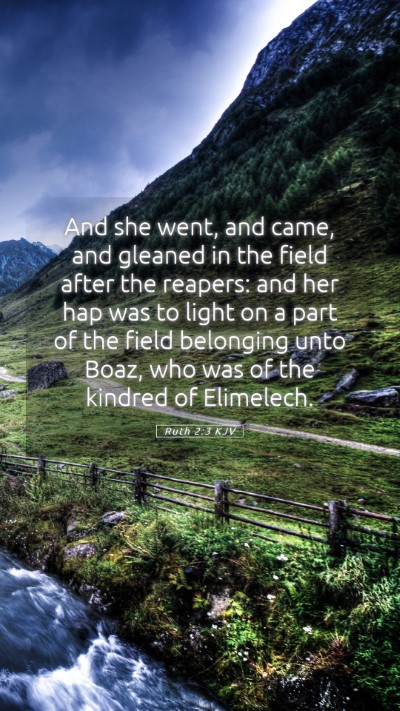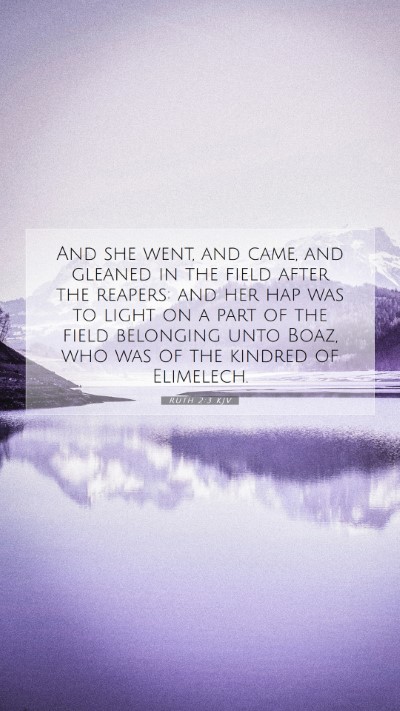Old Testament
Genesis Exodus Leviticus Numbers Deuteronomy Joshua Judges Ruth 1 Samuel 2 Samuel 1 Kings 2 Kings 1 Chronicles 2 Chronicles Ezra Nehemiah Esther Job Psalms Proverbs Ecclesiastes Song of Solomon Isaiah Jeremiah Lamentations Ezekiel Daniel Hosea Joel Amos Obadiah Jonah Micah Nahum Habakkuk Zephaniah Haggai Zechariah MalachiRuth 2:3 Meaning
What is the meaning of Ruth 2:3?
And she went, and came, and gleaned in the field after the reapers: and her hap was to light on a part of the field belonging unto Boaz, who was of the kindred of Elimelech.
Ruth 2:3 Bible Verse Meaning
Understanding Ruth 2:3
Ruth 2:3 states: "So Ruth went out and gleaned in the fields after the reapers; and she happened to come to the part of the field belonging to Boaz, who was of the family of Elimelech."
Overview of the Verse
This verse marks a pivotal moment in the Book of Ruth as it highlights Ruth's initiative to seek out sustenance for herself and her mother-in-law, Naomi. By gleaning in the fields, Ruth enters the realm of God's provision and divine orchestration, illustrating key themes of faith, loyalty, and divine guidance.
Bible Verse Meanings
- Faithfulness of Ruth: Ruth's actions demonstrate her loyalty and commitment to Naomi, her mother-in-law, which is a central theme in the narrative.
- God’s Providence: The phrase “she happened to come” suggests God’s guiding hand in Ruth’s life, leading her to Boaz’s field, a reflection of divine purpose.
- Gleaning Practices: Gleaning was a practice ordained in the Mosaic Law, representing God’s provision for the poor and the way in which He cares for the marginalized.
Bible Verse Interpretations
According to Matthew Henry, this act of gleaning becomes a means by which Ruth not only provides but also sets the stage for her eventual redemption through Boaz. Additionally, Albert Barnes points out that the passage reinforces the theme of divine intervention, suggesting that Ruth’s journey was not merely coincidental but rather a significant step in God’s redemptive plan.
In-depth Analysis
Adam Clarke emphasizes the social context of gleaning, where Ruth, as a Moabite widow, finds solace and sustenance through her diligent actions. This not only reveals her character but also sets in motion the events leading to her transformation from a foreigner to an integral part of the lineage of Israel's King David.
Spiritual Lessons
- Availability to Divine Opportunity: Ruth demonstrates that sometimes one must step out in faith to find God’s blessings.
- Community Support: The act of gleaning serves as a reminder of the importance of community and support for one another, particularly in times of distress.
Connecting with Scripture
Ruth 2:3 connects with various biblical themes and characters. A few related passages include:
- Leviticus 19:9-10: The law regarding gleaning and provision for the poor.
- Proverbs 3:5-6: Trust in the Lord leads to guidance, similar to Ruth's reliance on God in her circumstances.
- Matthew 5:7: "Blessed are the merciful" reflects Ruth’s care for Naomi as a central aspect of her character.
Application of the Verse
In applying Ruth 2:3 to daily life, believers are encouraged to trust in God’s guidance and to take initiative in serving others, as Ruth did. The story prompts reflections on how individuals can meet the needs of their communities while acknowledging God's providential hand at work.
Bible Study Insights
Engaging with this scripture offers valuable insights for Bible study groups as participants can explore the themes of faith, redemption, and divine providence. Discussions may revolve around how God's guidance can similarly lead them to purpose in their own lives.
Final Thoughts
The significance of Ruth 2:3 extends beyond its immediate narrative context. It serves as a profound reminder of how ordinary acts, infused with faith, can have extraordinary implications within God’s divine plan.


